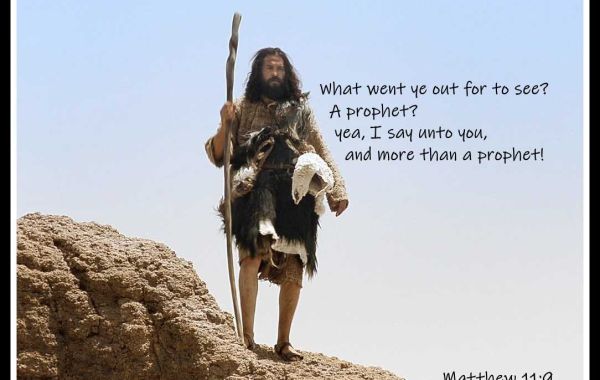Jesus Looks To John With Praise
When the disciples of John leave, Jesus then turns to the crowd who had just witnessed and probably overheard this exchange. It seems that Jesus wants to clear the air about John, was he wavering, was he failing, was he already a failure? So he asks the crowd a rhetorical question, something he does as much as teaching in parable. He asks in Matthew 11:7 What went ye out into the wilderness to see?
When you heard about this new prophet John the Baptist, what did you find when you went out of the cities and towns to hear him preach? Jesus continues Do you go out to see a reed shaken with the wind? But what went ye out for to see? A man clothed in soft raiment? behold, they that wear soft clothing are in kings' houses. But what went ye out for to see? Then Jesus answers the question, You went out to see a prophet? yea, I say unto you, and more than a prophet!”
Jesus says, John was the messenger of God sent to prepare the way before the Messiah a fulfillment of the last book of the Old Testament, Malachi chapter 3:1.
Jesus goes on giving His full testimony and support to the Baptist, Matthew 11:11 Verily I say unto you, Among them that are born of women there hath not risen a greater than John the Baptist. Can you imagine Jesus ever say that about anyone but John the Baptist. No one greater than John ever born. Powerful praise.
The Hard Sayings of Jesus - And then Jesus adds this statement, Matthew 11:11 notwithstanding (thought that is true yet) he that is least in the kingdom of heaven is greater than he.
This is one of the tough, hard sayings of Jesus. I believe it is hard for the same reason that Jesus didn’t directly answer John, it wasn’t yet time to reveal all. So Jesus gives the answer that is needed but in an indirect way. It tells us something about the coming kingdom but now all.
First, Jesus says that John was not in that coming kingdom of God, simply because it was not here yet, it has not been instituted on the earth. Second that the kingdom that John and Jesus preached was not the kingdom that John and the people of Israel expected right now but was yet a future kingdom. When that kingdom comes, first in a spiritual sense, it would bring with it knowledge, revelation, blessing and a mission that were greater than John’s. Even the least in the that Kingdom would be greater than John in this sense.
A.T. Robertsons explains it wonderfully, “The paradox of Jesus has puzzled many. He surely means that John is greater than all others in character, but that the least in the kingdom of heaven surpasses him in privilege. John is the end of one age and the beginning of the new era. All those that come after John stand upon his shoulders. John is the mountain peak between the old and the new. - A. T. Robertson, Word Pictures in the New Testament, (Nashville, TN: Broadman Press, 1933)
2nd hard Saying - Next in vs 2 we have another hard saying of Jesus concerning John and the Kingdom of Heaven. Matthew 11:12 And from the days of John the Baptist until now the kingdom of heaven suffereth violence, and the violent take it by force.
When John preached the reaction to his message was forceful, powerful, explosive in a word violent. It was violent both in its acceptance and in its rejection. In Luke 16:16, Luke says it this way, “The law and the prophets were until John: since that time the kingdom of God is preached, and every man presseth into it.” Jesus was saying this was not the way a man enters the kingdom it was not by force of will but by submission of will. We see an example of this in John 6:15 When Jesus therefore perceived that they would come and take him by force, to make him a king, he departed again into a mountain himself alone. Jesus was telling them you’ve got the wrong time, you’ve got the wrong action and you are missing the real kingdom. And that brings us to the last hard saying in this passage about John the Baptist.
3rd Hard saying, Look at Matthew 11:14-15 And if ye will receive it, this is Elias, (Elijah) which was for to come. He that hath ears to hear, let him hear.
Jesus was trying to tell them that the Kingdom you and John are expecting is a conditional one, “If you will receive it, will accept it, will believe it, John the Baptist is Elijah the forerunner.” But it was a condition that they as a nation, as a people had already missed. They chose violence, their own physical actions rather than their spiritual reaction to the messages of John and Jesus. John was not their Elijah and would not usher in the physical Kingdom but instead a spiritual one just as Jesus said in Luke 17:21 “Neither shall they say, Lo here! or, lo there! for, behold, the kingdom of God is within you.”
Jesus knew they would reject him as their Messiah, not all but taken as a whole, the nation would not receive John’s Message, “behold the Lamb of God.” The condition of their receiving by faith that message was not met and the violent Kingdom they expected and were striving for did not come.
Going In Greatness
There is a lot of application for us here, in fact the answers and hard sayings of Jesus all applies to us today and that should be a very sobering realization.
Least In The Kingdom - Jesus said, The least in the Kingdom has greater privilege, greater knowledge a greater mission that John. That is talking about us. Jesus gave us this rule in Luke 12:48 For unto whomsoever much is given, of him shall be much required: and to whom men have committed much, of him they will ask the more.
People Of The Kingdom - Jesus said, the Kingdom Is In Us. It cannot be forced, not to enter it and nor to oppose it. The Kingdom today is one we enter by repentance and faith, we submit to our King Jesus and His kingdom is within us and we are in that Kingdom in Him. Most of the parables told by Jesus were parables about the Kingdom and our place in it. So important that Matthew in chapter 13 retells 7 of them. “The kingdom of heaven is like unto…” a sower sowing seed, a field of wheat and tares, a grain of mustard seed, like leaven in a loaf, a treasure, a pearl of great price, a net catching all manner of fish. All of these tell us about the kingdom we now are citizens of. We have a place, we have a part and we have a responsibility because we are citizens of that Kingdom, members of the Lord’s church and children of God.
Offer Of The Kingdom - The last thing Jesus said to the nation of Israel doesn’t apply to us directly, that time is past and Israel must now wait until their Messiah appears in the eastern sky like lightning flashing from the east to the west. But what we do take with us from the last answer Jesus made is this. The offer of the kingdom then and now is conditional. I don’t care what some may say about being predestined, election or fate. God’s grace is open to all and all must make a choice, just as Israel was called to choose, we are called to choose.
Believe that Jesus is Lord and Savior or reject Him and depending on your choice you can enter the kingdom and take your place in blessing and privilege serving Him as King or you can walk away await the coming judgment what come as a consequence of your choice. Jesus said, “If you will receive it.” The same can be said of the Gospel as it was the Kingdom, if you will receive the good news. It is as simple as that, and it is as dangerous as that. “If you will”
Buscar
entradas populares
Categorías








